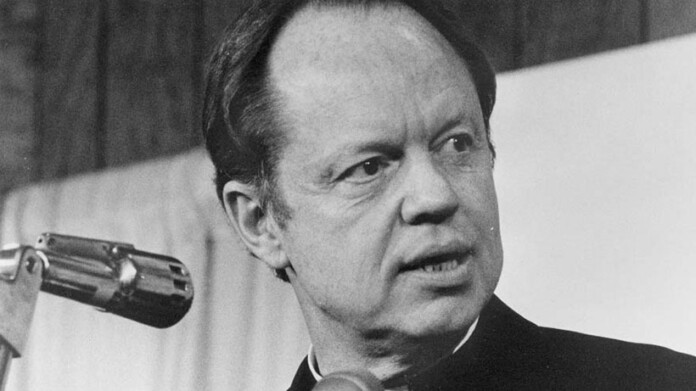Remembering the 1973 General Convention in Louisville
By Mark Michael
General Convention has rarely gathered in the mid-South, but it came to Louisville’s Kentucky Fair Exposition Center from September 29 to October 11, 1973. It was an anxious time in American society, and the church’s divisions were evident in the exhibit hall. There visitors could attend an art show focused on “current trends in vestments,” watch the Episcopal Peace Fellowship’s films on amnesty for conscientious objectors and rebuilding Indochina, or browse the Anglican Society’s display of historic prayer books.
The church had lost about 15 percent of its membership in the previous six years, after decades of steady growth. There were deep divisions over prayer book revision and the ordination of women to the priesthood, as well as the General Convention Special Program, which directed millions of dollars in church funds to “community empowerment” organizations working among the urban underclass, some of whom, critics said, had links to violence.
Executive Council had set the stage for a shift in emphasis several months earlier, drawing up a budget that significantly reduced funding for the Special Program (while pointedly rejecting a proposal for moving the Church Center out of Manhattan, despite a survey that found that 93.3% of the clergy backed relocation). Convention would approve the revised budget, and the Special Program was soon renamed and its controversial director, Leon Modeste, was dismissed.
On October 4, the Presiding Bishop election was held in Christ Church Cathedral, where our next Presiding Bishop will also be selected. The Rt. Rev. John Maury Allin of Mississippi, a moderate with a long record of national service, was chosen on the second ballot. The election results, which were shared publicly for the first time, showed that Allin’s closest opponent was Bishop Robert Spears of Rochester, a supporter of the ordination of women and a Vietnam War opponent. Allin’s confirmation was extensively debated in the House of Deputies, another unprecedented step, but he was eventually confirmed by wide margins.
In a press conference after the confirmation, Allin pledged to continue the church’s grant programs focused on empowering minority communities and said he would not interfere with its discernment on women’s ordination (though he was personally opposed).
The Living Church, which called Allin “a splendid choice,” pushed back at attacks on his character: “One of the nasty tricks used against him by some opponents at Louisville was the charge of racism,” wrote editor Carroll Simcox. “Absolutely the only ‘foundation’ for any such question about him is that he is Bishop of Mississippi. To pin the racist label on him for that reason is about as reasonable as to assume that the Bishop of Milwaukee must be president of a brewing company.”
Shortly after Allin’s election was announced, the deputies began debating the ordination of women. Enthusiasm among supporters was high, as a similar resolution had passed handily in the House of Bishops in 1970 before being narrowly defeated by the clergy. At its concurrent Triennium, the Episcopal Church Women endorsed the proposal by wide margins.
In the end, the House of Deputies defeated the resolution, though its supporters claimed that a majority of deputies had backed it. Proposals to suspend the canons requiring voting by diocese and approval by two successive conventions were similarly rebuffed.
Fifty-nine bishops promptly issued a statement decrying the vote. “Finally and inevitably, the sense of justice prevails and it becomes essential to see that all human rights are available to all human beings,” they wrote. “We affix our names … to let this church know that this issue of moral justice and theological justification must not rest until all have known equal treatment in their search for vocation.” Three members of the House would step forward less than a year later to ordain the Philadelphia Eleven.
 The 1973 Convention also approved a rite that reframed confirmation as a repeatable renewal of baptismal vows as part of continued prayer book revision, over the objection of conservatives like Simcox, who described the experimental liturgies as “virtually new beginnings, having a most tenuous connection with the Anglican tradition of faith and worship.” A proposal to include the whole of the 1928 prayer book in the new version failed, and Authorized Services 1973, known popularly as “The Zebra Book” for its striped cover, would soon fill pews racks across the church. Plans were set for a final vote on a new prayer book three years later.
The 1973 Convention also approved a rite that reframed confirmation as a repeatable renewal of baptismal vows as part of continued prayer book revision, over the objection of conservatives like Simcox, who described the experimental liturgies as “virtually new beginnings, having a most tenuous connection with the Anglican tradition of faith and worship.” A proposal to include the whole of the 1928 prayer book in the new version failed, and Authorized Services 1973, known popularly as “The Zebra Book” for its striped cover, would soon fill pews racks across the church. Plans were set for a final vote on a new prayer book three years later.
The 1973 Convention authorized the creation of five new dioceses — San Diego, Northern and Southern Philippines, and Northern and Western Mexico — and renamed the Diocese of New Mexico and Southwest Texas as the Diocese of the Rio Grande. It liberalized the marriage canons, allowing divorced people to be remarried in church. Labor leader Cesar Chavez addressed both houses of Convention, calling for a boycott on lettuce and table grapes (politely rebutted by an official of the American Farm Bureau).
The Yom Kippur War broke out halfway through the proceedings. The Convention responded with a statement expressing dismay at the violation of boundaries and the resumption of hostilities. It urged Episcopalians to pray for a just peace, while carefully refusing to assign blame to either side.
The Convention also resisted a few calls to action. It rejected a motion calling for amnesty for those who dodged the draft, and one that would have consolidated the church’s seminaries into four regional clusters. It defeated a call for proportional representation in the House of Deputies and for shrinking its size. “Concerns that a house of 904 deputies is unwieldy and inefficient were brushed aside,” wrote a TLC reporter.
“An enlarged sense of trust replaced the tensions which featured particularly in the [1970] convention at Houston. Bishops and deputies alike showed inclinations for more cooperation and less dispute,” TLC concluded. Indeed, church membership would grow again during the coming triennium, though challenging times also lay ahead.




